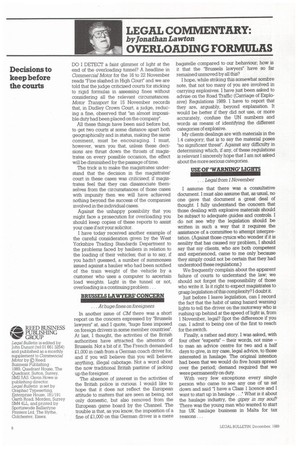LEGAL COMMENTARY:
Page 164

If you've noticed an error in this article please click here to report it so we can fix it.
by Jonathan Lawton
OVERLOADING FORMULAS
DO I DETECT a faint glimmer of light at the end of the overloading tunnel? A headline in Commercial Motor for the 16 to 22 November reads "Fine slashed in High Court" and we are told that the judge criticised courts for sticking to rigid formulas in assessing fines without considering all the relevant circumstances. Motor Transport for 15 November records that, in Dudley Crown Court, a judge, reducing a fine, observed that "an almost impossible duty had been placed on the company'.
All these things have been said before but, to get two courts at some distance apart both geographically and in status, making the same comment, must be encouraging. I must, however, warn you that, unless these decisions are thrust down the throats of magistrates on every possible occasion, the effect will be diminished by the passage of time.
The trick is to make the magistrates understand that the decision in the magistrates' court in these cases was criticised; if magistrates feel that they can disassociate themselves from the circumstances of those cases with impunity then we will have achieved nothing beyond the success of the companies involved in the individual cases.
Against the unhappy possibility that you might face a prosecution for overloading you should keep copies of these reports to acsist your (lase if not your solicitor.
I have today received another example of the careful consideration given by the West Yorkshire Trading Standards Department to the problems faced by hauliers in relation to the loading of their vehicles; that is to say, if you hadn't guessed, a number of summonses issued against a haulier who had been notified of the train weight of the vehicle by a customer who uses a computer to ascertain load weights. Light in the tunnel or not, overloading is a continuing problem..
BRUSSELS LAWYERS' CONCERN . At huge fines on foreigners In another issue of CM there was a short report on the concern expressed by "Brussels lawyers" at, and I quote, "huge fines imposed on foreign drivers in some member countries". At last, I thought, the activities of the British authorities have attracted the attention of Brussels. Not a bit of it. The French demanded £1,000 in cash from a German coach driver for, and if you will believe this you will believe anything, illegal cabotage. Not a word about the now traditional British pastime of jacking up the foreigner.
The absence of interest in the activities of the British police is curious. I would like to hope that it does not reflect the European attitude to matters that are seen as being, not only domestic, but also removed from the European game board by the Channel. The trouble is that, as you know, the imposition of a fine of £1,000 on this German driver is a mere bagatelle compared to our behaviour; how is it that the "Brussels lawyers" have so far remained unmoved by all this?
I hope, while striking this somewhat sombre note, that not too many of you are involved in carrying explosives. I have just been asked to advise on the Road Traffic (Carriage of Explosive) Regulations 1989. I have to report that they are, arguably, beyond explanation. It would be better if they did not use, or more accurately, confuse the UN numbers and words as means of identifying the different categories of explosive.
My clients dealings are with materials in the 1.4 category; that is to say the material poses "no significant threat". Against any difficulty in determining which, if any, of these regulations is relevant I sincerely hope that I am not asked about the more serious categories.
USE OF 'WARNING LIGHTS . . Legal from I November I assume that there was a consultative document. I must also assume that, as usual, no one gave that document a great deal of thought. I fully understand the concern that those dealing with explosive materials should be subject to adequate guides and controls. I do not see why the legislation should be written in such a way that it requires the assistance of a committee to attempt interpretation. (Against those cynics who wonder if it is senility that has caused my problem, I should say that my clients, who are both competent and experienced, came to me only because they simply could not be certain that they had understood these regulations.) We frequently complain about the apparent failure of courts to understand the law; we should not forget the responsibility of those who write it. Is it right to expect magistrates to grasp legislation of this complexity? I doubt it.
Just before I leave legislation, can I record the fact that the habit of using hazard warning lights to tell the driver on the motorway who is rushing up behind at the speed of light is, from 1 November, legal? Spot the difference if you can. I admit to being one of the first to reach for the switch.
Finally, a rather sad story. I was asked, with four other "experts" their words, not mine to man an advice centre for two and a half days to give, in my case, legal advice, to those interested in haulage. The original intention had been that we would do five hours spread over the period; demand required that we were permanently on duty.
With very few exceptions every single person who came to see any one of us sat down and said "I have a Class 1 licence and I want to start up in haulage . . ." What is it about the haulage industry, the gipsy in my soul? There was the young man who wanted to start his UK haulage business in Malta for tax reasons . . .




































































































































































